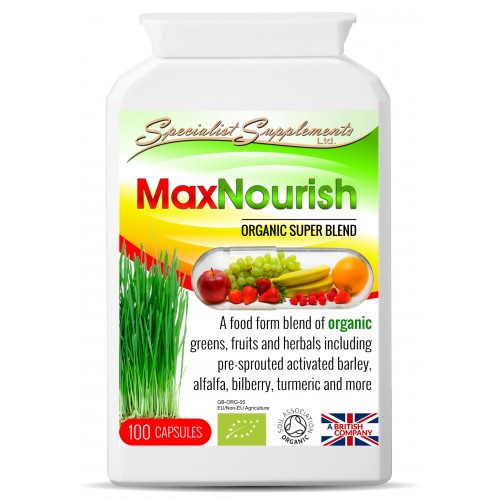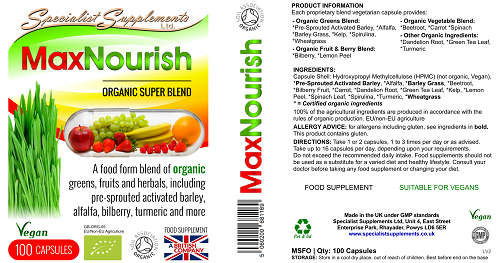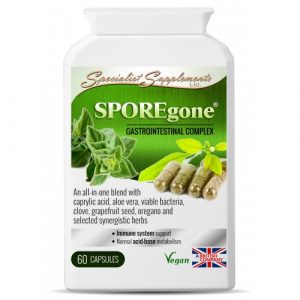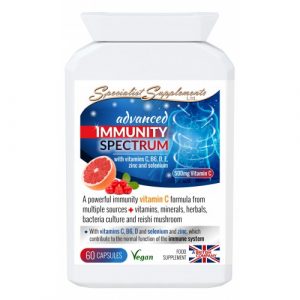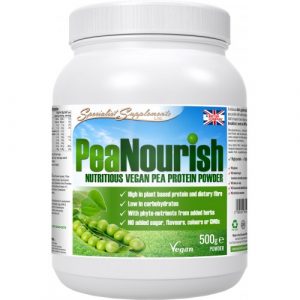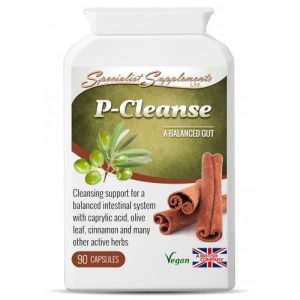Description






100 capsules: Organic multi-nutrient superfood supplement
Pre-sprouted activated barley, alfalfa, barley grass, beetroot, bilberry fruit, carrot, dandelion root, green tea leaf, kelp, lemon peel, spinach leaf, spirulina, turmeric and wheatgrass.
Originally based on a formula by master herbalist, Dr John R. Christopher, with the addition of some other potent superfoods, superfruits and herbs, it is an all-round multi-nutrient blend in easy-to-take capsules – no poorly-absorbed synthetic vitamins and minerals.
The broad-spectrum nutrients (which include phytochemicals, enzymes, dietary fibre, beneficial oils, antioxidants, vitamins and minerals) are easily absorbed and used by the body, as they are in their natural food form and balanced state.
Quickly and easily access 14 organic fruits, berries, vegetables and herbs on a daily basis, with just this one convenient food supplement.
MaxNourish at a glance…
Fruit, vegetable and herbal combination
14 food-based ingredients
Soil Association and EU certified organic
Dairy-free
Kosher approved
Suitable for vegetarians and vegans
About the ingredients…
Pre-sprouted activated barley:
Barley has been used as a nutritious food staple for thousands of years. For example, the Roman army marched on it; it was the main component of their diet. Similarly, Greek gladiators trained on it and were known as “barley eaters.” In ancient Rome, a food made from sprouted barley, honey and colostrum was used to sustain infants whose mother’s died in childbirth. In more recent years, the same formula has been used by the UN to prevent starvation in 3rd world countries.
With pre-sprouted barley, all of the enzyme and nutrient activity in the grain is captured just before sprouting. It contains a range of nutrients, including tocotrienols, beta-glucans, vitamins (including vitamin A, B1, B2, B3, B5, B6, folic acid and vitamin E), minerals (including potassium, calcium, phosphorus, magnesium, iron, zinc, copper, and manganese), all 8 essential amino acids, fatty acids (essential fatty acids – linoleic acid (omega 6), linolenic acid (omega 3), as well as lauric acid, stearic acid and oleic acid), soluble fibre and enzymes (including Super Oxide Dismutase). It also ranks low on the glycemic index and, as a long-chain carbohydrate that takes up to 4 hours to break down in the digestive tract, provides a slow, sustained release of energy.
Alfalfa:
Alfalfa (Medicago sativa) is native to Asia but is now found in temperate regions. This sprout contains alkaloids, isoflavones, coumarins and sterols. It also contains 8 essential enzymes: – amylase (digests starches), coagulase (coagulates milk), invertase (converts sugar into dextrose), emulsin (acts upon sugars), peroxidase (oxidases blood), lipase (fat-splitting enzyme), pectinase (forms a vegetable jelly from pectin) and protease (digests protein). Together with its rich content of enzymes, alfalfa offers a broad spectrum of vitamins and minerals including pro-vitamin A (B-carotene), B6, C, D, E, K and P. Alfalfa yields 10 times more mineral value than average grains. The roots penetrate sub-soil as far as 125 feet, thereby enabling it to absorb vital mineral nutrients beyond the reach of other vegetation (including calcium, magnesium, phosphorous and potassium).
Barley grass:
Barley grass is the leaf portion of the barley plant. It is a source of dietary fibre, organic sodium, vitamins (such as beta carotene, vitamins B1, B2, B6, C, folic acid and pantothenic acid), minerals (such as potassium, calcium, magnesium, iron, copper, zinc, phosphorus and manganese), amino acids, enzymes (such as superoxide dismutase (SOD)) and phytonutrients (such as chlorophyll).
Beetroot:
Beetroot is the taproot portion of the beet plant. It is one of several of the cultivated varieties of Beta vulgaris grown for their edible taproots and their leaves (called beet greens). It is a source of dietary fibre, folate (vitamin B9), manganese, potassium, iron and vitamin C. The deep red colour of beetroot results from the presence of a type of betalain pigment (betacyanins). Beetroot is also a source of betaine and inorganic nitrates.
Bilberry fruit:
The bilberry (Vaccinium myrtillus) is a round, flat-topped, tiny fruit that grows in the wild, and is seldom cultivated. The berries grow profusely on small, wiry shrubs, mainly on high ground in the north and west of the British Isles. Due to its small size and blue colour, it is often mistaken for a blueberry, but it actually tastes quite different.
Carrot:
The carrot (Daucus carota) is a root vegetable, which is often under-rated in terms of its nutritional content. Carrots are a particularly good source of vitamin A (from beta-carotene), dietary fibre, potassium, biotin, vitamin K (phylloquinone) and vitamin B6.
Dandelion root:
The roots of the dandelion plant contain a complex carbohydrate called inulin, as well as vitamins (including A, B complex, C and D), minerals (including zinc, calcium, iron and potassium) and compounds called sesquiterpene lactones.
Green tea leaf:
Camellia thea, or green tea, is a source of catechin polyphenols – Epigallocatechin gallate (EGCG), in particular.
Kelp:
Kelp is a large edible seaweed (algae), which grows in underwater “forests” in shallow oceans. It contains vitamins (such as A, B1, B2, C, D and E), minerals (such as iodine, vanadium, zinc, magnesium, iron, potassium, copper and calcium), enzymes (haloperoxidases), amino acids (including tryptophan, threonine, isoleucine, methionine, cysteine and valine) and chlorophyll.
Iodine contributes to: normal cognitive function, normal energy-yielding metabolism, normal functioning of the nervous system, the maintenance of normal skin, the normal production of thyroid hormones and normal thyroid function, as well as to the normal growth of children. Click here, here, here, here, here, here, here and here for various EFSA scientific opinions.
Lemon peel:
Lemon peel contains pectin, fibre, calcium, potassium and vitamin C, as well as citrus bio-flavonoids.
Spinach leaf:
Spinach (Spinacia oleracea) is an edible flowering plant in the family Amaranthaceae native to central and western Asia. It contains vitamins A, B2, B6, B9 C, E and K, lutein, magnesium, manganese, folate, betaine, iron, calcium, potassium, folic acid, copper, protein, phosphorus, zinc, niacin, selenium and Omega 3 oils. More recently, opioid peptides called rubiscolins have also been found in spinach.
Spirulina:
Spirulina is a blue-green microalgae. It contains between 55 and 70% protein (more than beef, chicken, and soybeans), 8 essential and 10 non-essential amino acids, as well as gamma-linolenic acid (GLA), beta-carotene, linoleic acid, arachidonic acid, vitamin K, pantothenic acid, magnesium, potassium, thiamin, riboflavin, niacin, iron, copper, manganese, nucleic acids RNA and DNA, chlorophyll and phycocyanin (a pigment-protein complex that is found only in blue-green algae).
Turmeric:
Turmeric (Curcuma longa) is a rhizomatous herbaceous perennial plant of the ginger family, Zingiberaceae. It is a spice that contains dietary fibre, volatile oil, vitamins (such as vitamin C and vitamin B6), minerals (such as potassium, calcium, iron and magnesium) and the yellow pigment, curcumin.
Wheatgrass:
The crop from the germinated seed of wheat grains, wheatgrass is a source of chlorophyll, plant protein, enzymes (including superoxide dismutase (SOD)), vitamins (including vitamins A, C, K, E and all the B vitamins) and trace minerals (including iron, phosphate, boron, copper, selenium, sodium, calcium, magnesium, potassium, chromium, manganese and zinc).

